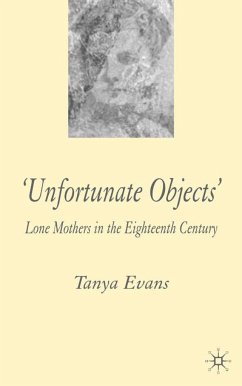This book analyzes how poor eighteenth-century London women coped when they found themselves pregnant, their survival networks and the consequences of bearing an illegitimate child. It does so by exploring the encounters between poor women and the parish as well as London's lying-in hospitals and the Foundling Hospital. It suggests that unmarried mothers did not constitute a deviant minority within London's plebeian community. In fact, many could expect to find compassion rather than ostracism a response to their plight. All poor mothers, left without the support of their child's father, shared similar strategies of survival and economies of makeshift.
'In providing insights into the love, duty and obligation felt by poor plebeian mothers towards their children, and in exposing the complexities behind the abandonment of babies by showing that it cannot simply be equated with illegitimacy or indifference, Evans makes significant contributions to the historiographies of eighteenth-century maternity, illegitimacy, the plebeian experience, and poverty, as well as touching on those of infanticide and courtship. There is no doubt that this book will be invaluable to anyone teaching or researching the family, marriage, childhood, gender, the urban poor or sexuality.' - Reviews in History
'The principal strength of this book is the impressive scope of its research...Evans goes some way to bringing to life the makeshift economy of lone motherhood in the eighteenth-century metropolis. The book is generously peppered with first-hand accounts of poor, lone mothers, illustrating an enormous diversity of experience. These mini-biographies are a pleasure to read...' - Thomas Nutt, Local Population Studies
'Evans's study is admirably balanced, moving confidently between statistical data, popular literature and the voices of the women themselves.' - Women: A Cultural Review
'The principal strength of this book is the impressive scope of its research...Evans goes some way to bringing to life the makeshift economy of lone motherhood in the eighteenth-century metropolis. The book is generously peppered with first-hand accounts of poor, lone mothers, illustrating an enormous diversity of experience. These mini-biographies are a pleasure to read...' - Thomas Nutt, Local Population Studies
'Evans's study is admirably balanced, moving confidently between statistical data, popular literature and the voices of the women themselves.' - Women: A Cultural Review









